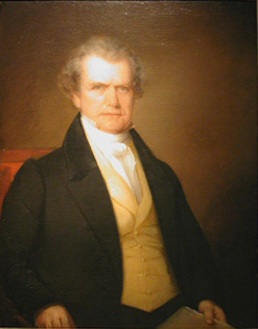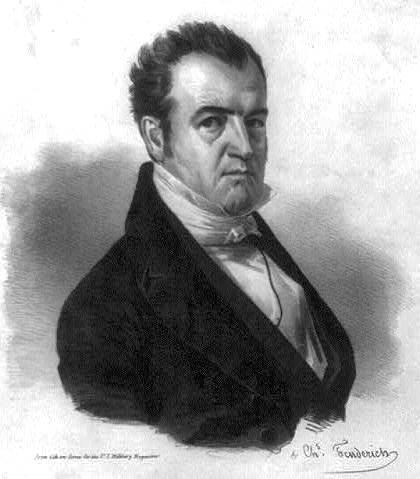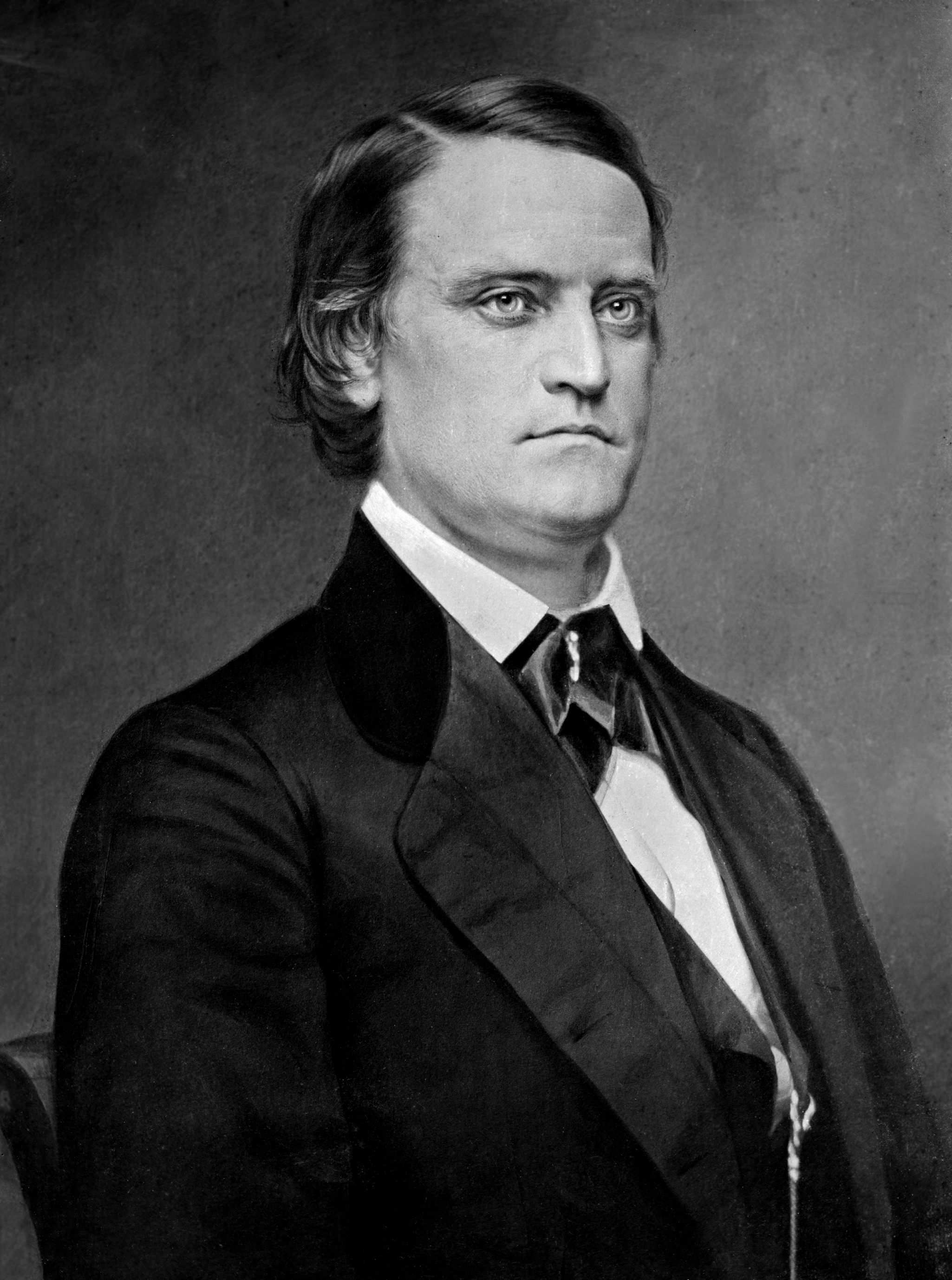|
Reese Bowen Brabson
Reese Bowen Brabson (September 16, 1817 – August 16, 1863) was an American politician who represented Tennessee's 3rd district in the United States House of Representatives from 1859 to 1861. He also served one term in the Tennessee House of Representatives, from 1851 to 1852. Brabson opposed secession, and took no active part in the Civil War. Life and career Brabson was born at Brabson's Ferry Plantation near Sevierville on September 16, 1817. He graduated from Maryville College in Maryville, Tennessee in 1840, studied law in Dandridge,Gary C. Jenkins,Reese Bowen Brabson" ''Tennessee Encyclopedia of History and Culture''. Retrieved: 2 May 2013. and was admitted to the bar in 1848. He commenced practice of law in Chattanooga, Tennessee, in partnership with James A. Whiteside. Brabson was an elector for presidential candidate Zachary Taylor in 1848. Oliver Perry Temple,Reese B. Brabson" ''Notable Men of Tennessee'' (Cosmopolitan Press, 1912), pp. 75-76. He represent ... [...More Info...] [...Related Items...] OR: [Wikipedia] [Google] [Baidu] |
Tennessee's 3rd Congressional District
The 3rd congressional district of Tennessee is a congressional district in East Tennessee. It has been represented by Republican Chuck Fleischmann since January 2011. Current boundaries The district comprises two halves, joined together through a narrow tendril in Roane County near Ten Mile. The upper half borders Kentucky to the north and is composed of Scott, Morgan, Roane, Anderson, and Union counties, as well as most of Campbell County. The lower half borders North Carolina to the east and Georgia to the south. It is composed of Hamilton, Polk, McMinn, and Monroe, and the southern half of Bradley County. Characteristics The third district has been centered on Chattanooga since before the Civil War. In terms of density, the district is sparsely populated, as much of it is located within the Appalachian Mountains. Almost half of the district's population lives in Hamilton County. Election results from presidential races History The 3rd district is on the divi ... [...More Info...] [...Related Items...] OR: [Wikipedia] [Google] [Baidu] |
Dandridge, Tennessee
Dandridge is a town in and the county seat of Jefferson County, Tennessee, United States. It had a population of 3,344 at the 2020 census. The town is part of the Morristown, Tennessee Metropolitan Statistical Area, which consists of Jefferson, Hamblen, and Grainger counties. It is considered a suburb of Knoxville based on its proximity to the city, and the connection between the two via Interstate 40. Dandridge bills itself as the "second oldest town in Tennessee" (behind only Jonesborough in Washington County).Billie McNamara,Jefferson County, Tennessee Genealogy & History" 1996-2004. Retrieved: 18 February 2008. Most of the downtown area of Dandridge sits below the high level water mark of Douglas Lake and is protected by a levee made out of stone. History In the 16th century, a substantial Native American chiefdom known as Chiaha was located on Zimmerman's Island, just southwest of Dandridge along the French Broad River. Spanish explorer Hernando de Soto spent several w ... [...More Info...] [...Related Items...] OR: [Wikipedia] [Google] [Baidu] |
Battle Of Stones River
The Battle of Stones River, also known as the Second Battle of Murfreesboro, was a battle fought from December 31, 1862, to January 2, 1863, in Middle Tennessee, as the culmination of the Stones River Campaign in the Western Theater of the American Civil War. Of the major battles of the war, Stones River had the highest percentage of casualties on both sides. The battle ended in Union victory after the Confederate army's withdrawal on January 3, largely due to a series of tactical miscalculations by Confederate General Braxton Bragg, but the victory was costly for the Union army. Nevertheless, it was an important victory for the Union because it provided a much-needed boost in morale after the Union's recent defeat at Fredericksburg and also reinforced President Abraham Lincoln's foundation for issuing the Emancipation Proclamation, which ultimately discouraged European powers from intervening on the Confederacy's behalf. Union Maj. Gen. William S. Rosecrans's Army of the Cu ... [...More Info...] [...Related Items...] OR: [Wikipedia] [Google] [Baidu] |
Great Locomotive Chase
The Great Locomotive Chase (also known as Andrews' Raid or the Mitchel Raid) was a military raid that occurred April 12, 1862, in northern Georgia during the American Civil War. Volunteers from the Union Army, led by civilian scout James J. Andrews, commandeered a train, '' The General'', and took it northward toward Chattanooga, Tennessee, doing as much damage as possible to the vital Western and Atlantic Railroad (W&A) line from Atlanta to Chattanooga as they went. They were pursued by Confederate forces at first on foot, and later on a succession of locomotives, including '' The Texas'', for . Because the Union men had cut the telegraph wires, the Confederates could not send warnings ahead to forces along the railway. Confederates eventually captured the raiders and quickly executed some as spies, including Andrews; some others were able to flee. The surviving raiders were the first to be awarded the newly-created Medal of Honor by the US Congress for their actions. As a ci ... [...More Info...] [...Related Items...] OR: [Wikipedia] [Google] [Baidu] |
Court-martial
A court-martial or court martial (plural ''courts-martial'' or ''courts martial'', as "martial" is a postpositive adjective) is a military court or a trial conducted in such a court. A court-martial is empowered to determine the guilt of members of the armed forces subject to military law, and, if the defendant is found guilty, to decide upon punishment. In addition, courts-martial may be used to try prisoners of war for war crimes. The Geneva Conventions require that POWs who are on trial for war crimes be subject to the same procedures as would be the holding military's own forces. Finally, courts-martial can be convened for other purposes, such as dealing with violations of martial law, and can involve civilian defendants. Most navies have a standard court-martial which convenes whenever a ship is lost; this does not presume that the captain is suspected of wrongdoing, but merely that the circumstances surrounding the loss of the ship be made part of the official record. M ... [...More Info...] [...Related Items...] OR: [Wikipedia] [Google] [Baidu] |
James J
James is a common English language surname and given name: *James (name), the typically masculine first name James * James (surname), various people with the last name James James or James City may also refer to: People * King James (other), various kings named James * Saint James (other) * James (musician) * James, brother of Jesus Places Canada * James Bay, a large body of water * James, Ontario United Kingdom * James College, a college of the University of York United States * James, Georgia, an unincorporated community * James, Iowa, an unincorporated community * James City, North Carolina * James City County, Virginia ** James City (Virginia Company) ** James City Shire * James City, Pennsylvania * St. James City, Florida Arts, entertainment, and media * ''James'' (2005 film), a Bollywood film * ''James'' (2008 film), an Irish short film * ''James'' (2022 film), an Indian Kannada-language film * James the Red Engine, a character in ''Thomas the Tank En ... [...More Info...] [...Related Items...] OR: [Wikipedia] [Google] [Baidu] |
John Bell (Tennessee Politician)
John Bell (February 18, 1796September 10, 1869) was an American politician, attorney, and planter who was a candidate for President of the United States in the election of 1860. One of Tennessee's most prominent antebellum politicians,Jonathan Atkins,John Bell" ''Tennessee Encyclopedia of History and Culture'', 2009. Retrieved: October 10, 2012. Bell served in the House of Representatives from 1827 to 1841, and in the Senate from 1847 to 1859. He was Speaker of the House for the 23rd Congress (1834–1835), and briefly served as Secretary of War during the administration of William Henry Harrison (1841). In 1860, he ran for president as the candidate of the Constitutional Union Party, a third party which took a neutral stance on the issue of slavery. and won the electoral votes of three states. Initially an ally of Andrew Jackson, Bell turned against Jackson in the mid-1830s and aligned himself with the National Republican Party and then the Whig Party, a shift that ea ... [...More Info...] [...Related Items...] OR: [Wikipedia] [Google] [Baidu] |
Constitutional Union Party (United States)
The Constitutional Union Party was a United States third party active during the 1860 elections. It consisted of conservative former Whigs, largely from the Southern United States, who wanted to avoid secession over the slavery issue and refused to join either the Republican Party or the Democratic Party. The Constitutional Union Party campaigned on a simple platform "to recognize no political principle other than the Constitution of the country, the Union of the states, and the Enforcement of the Laws". The Whig Party had collapsed in the 1850s due to a series of sectional crises over slavery. Though some former Whigs joined the Democratic Party or the new, anti-slavery Republican Party, others joined the nativist American Party. The American Party entered a period of rapid decline following the 1856 elections, and in the lead-up to the 1860 elections John J. Crittenden and other former Whigs founded the Constitutional Union Party. The 1860 Constitutional Union Convention ... [...More Info...] [...Related Items...] OR: [Wikipedia] [Google] [Baidu] |
Thirty-sixth United States Congress
The 36th United States Congress was a meeting of the legislative branch of the United States federal government, consisting of the United States Senate and the United States House of Representatives. It met in Washington, D.C. from March 4, 1859, to March 4, 1861, during the third and fourth years of James Buchanan's presidency. The apportionment of seats in the House of Representatives was based on the Seventh Census of the United States in 1850. The Senate had a Democratic majority, and the House had a Republican plurality. Major events * June 8, 1859: Comstock Lode discovered in the western Utah Territory (present-day Nevada) * August 27, 1859: First oil well was drilled in the United States, near Titusville, Pennsylvania * October 16–18, 1859: John Brown's raid on Harpers Ferry * December 2, 1859 John Brown executed. * April 3, 1860: Pony Express began its first run * April 23 – May 3, 1860: Democratic National Convention held in Charleston, South Carolina. Unab ... [...More Info...] [...Related Items...] OR: [Wikipedia] [Google] [Baidu] |
Tennessee General Assembly
The Tennessee General Assembly (TNGA) is the state legislature of the U.S. state of Tennessee. It is a part-time bicameral legislature consisting of a Senate and a House of Representatives. The Speaker of the Senate carries the additional title and office of Lieutenant Governor of Tennessee. In addition to passing a budget for state government plus other legislation, the General Assembly appoints three state officers specified by the state constitution. It is also the initiating body in any process to amend the state's constitution. Organization Constitutional structure According to the Tennessee State Constitution of 1870, the General Assembly is a bicameral legislature and consists of a Senate of thirty-three members and a House of Representatives of ninety-nine members. The representatives are elected to two-year terms; according to a 1966 constitutional amendment the senators are elected to four-year terms which are staggered, with the districts with even numbers being ele ... [...More Info...] [...Related Items...] OR: [Wikipedia] [Google] [Baidu] |
Hamilton County, Tennessee
Hamilton County is a county located in the U.S. state of Tennessee. It is located in the southern part of East Tennessee on the border with Georgia. As of the 2020 census, the population was 366,207, making it the fourth-most populous county in Tennessee. Its county seat is Chattanooga, located along the Tennessee River. The county was named for Alexander Hamilton, the first Secretary of the Treasury. Hamilton County is one of 95 counties within Tennessee. Hamilton County is part of the Chattanooga, TN- GA Metropolitan Statistical Area. The county was created on October 25, 1819. Hamilton County expanded to meet the state line with Georgia after absorbing parts of three different counties including Bledsoe, Marion, and Rhea. Part of the traditional Cherokee homeland, the county was created after the Cherokee signed a treaty in 1817 with the United States and ceded land north of the Hiwassee River. In the 21st century, Hamilton County is the eighth-highest income Tennessee ... [...More Info...] [...Related Items...] OR: [Wikipedia] [Google] [Baidu] |
Oliver Perry Temple
Oliver Perry Temple (January 27, 1820 – November 2, 1907) was an American attorney, author, judge, and economic promoter active primarily in East Tennessee in the latter half of the 19th century.Mary Rothrock, ''The French Broad-Holston Country: A History of Knox County, Tennessee'' (Knoxville, Tenn.: East Tennessee Historical Society, 1972), pp. 495-497. During the months leading up to the Civil War, Temple played a pivotal role in organizing East Tennessee's Unionists. In June 1861, he drafted the final resolutions of the pro-Union East Tennessee Convention, and spent much of the first half of the war providing legal defense for Unionists who had been charged with treason by Confederate authorities.Oliver P. Temple, ''East Tennessee and the Civil War'' (Johnson City, Tenn.: Overmountain Press, 1995), pp. 156-157, 172-173, 194-197, 234-235, 340, 349, 400, 474. After the war, Temple promoted agricultural and industrial development in East Tennessee, most notably by assisting ... [...More Info...] [...Related Items...] OR: [Wikipedia] [Google] [Baidu] |







